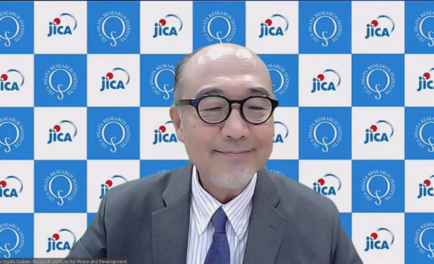Navigating the Future of International Development Cooperation Amidst Global Challenges: The Seoul ODA International Conference
2023.11.02
A series of global crises over the past three years has pushed existing models of development cooperation to their most severe test in decades. Achieving the goal of a better world for all has become more elusive due to new financial constraints, heightened humanitarian demands, and increasingly complex political landscapes.
The 16th Seoul ODA International Conference was held by the Ministry of Foreign Affairs of the Republic of Korea and the Korea International Cooperation Agency in Seoul on Sept. 7, 2023, under the theme “Future of International Development Cooperation: Global Solidarity and Cross-sectoral Approaches in a World of Challenges.” Mine Yoichi, executive director of the JICA Ogata Sadako Research Institute for Peace and Development (JICA Ogata Research Institute), gave an online presentation in Session 3 “The Future of International Development Cooperation for Co-prosperity.”
In Session 3, Carlos Javier Castillo Pérez, general director of the Mexican Agency for International Cooperation for Development (AMEXCID), presented the Mexican system of international development cooperation. He highlighted the viability of conditional cash transfer programs combined with training to support regional peace and development. Tormarbulang Lumbantobing, chief executive officer of the Indonesian Agency for International Development, discussed the future of international cooperation for co-prosperity, demonstrating that strengthening international cooperation could be achieved through complementarities between cooperation models, coordination of policies and initiatives, and knowledge sharing and peer learning.
Mine began his presentation titled “Human Security for Future Development Cooperation,” by arguing that the concept of human security is expected to be an important philosophy for future development cooperation. He explained the changes in the global landscape of post-World-War development cooperation by demonstrating its transformation from the principle of aiming at supporting state-building efforts of developing countries to today’s normative model of international cooperation, in which the relationships between sovereign nations in the North and South are becoming more or less symmetrical. He underscored the growing need for cooperation due to the complexity of global crises, which has made it impossible for any single country to address them individually.

Mine Yoichi, executive director of the JICA Ogata Research Institute,
stressed the importance of a new paradigm for development cooperation
that involves more horizontal collaboration among diverse actors.
Drawing on an article written by JICA President Tanaka Akihiko, Mine presented a framework for understanding complex global challenges, classifying them into three layers. First, the physical system causes natural disasters including those which are induced by climate change. Second, the living system involves infectious diseases and agricultural crises. Third, the human social system gives rise to wars, economic crises, and extreme poverty. He added that these systems are interconnected, and human activities in one system often lead to problems in another. For example, climate change results from activities in the human social system, and infectious diseases can be caused by human intervention in the living system. And in our time, this interconnectedness is more visible than ever.
To address these complex and cascading threats, Mine stressed the importance of a new paradigm for development cooperation that involves more horizontal collaboration among diverse actors, including governments, the private sector, civil society, religious communities, academia, and more. “We should secure freedom and security for each and every person by mobilizing solidarity-based resources, combining top-down government protection and bottom-up citizen empowerment, and focusing on community resilience and human dignity. This is the principle of human security,” he said.
Mine also noted Japan's commitment to human security as the guiding principle of its development cooperation. He closed his presentation by emphasizing the importance of balancing national interests with the provision of international public goods in reshaping the world order that is becoming increasingly multipolar.
Responding to a question about possible innovative approaches that could be implemented to enhance development cooperation for co-prosperity, Mine said that innovation could take place not from an isolated place but through interactions between existing forces, through organizing horizontal collaboration between different actors. He cited JICA’s current policy of working closely with the business sectors, civil society actors, and other donors.

事業事前評価表(地球規模課題対応国際科学技術協力(SATREPS)).国際協力機構 地球環境部 . 防災第一チーム. 1.案件名.国 名: フィリピン共和国.

事業事前評価表(地球規模課題対応国際科学技術協力(SATREPS)).国際協力機構 地球環境部 . 防災第一チーム. 1.案件名.国 名: フィリピン共和国.

事業事前評価表(地球規模課題対応国際科学技術協力(SATREPS)).国際協力機構 地球環境部 . 防災第一チーム. 1.案件名.国 名: フィリピン共和国.

事業事前評価表(地球規模課題対応国際科学技術協力(SATREPS)).国際協力機構 地球環境部 . 防災第一チーム. 1.案件名.国 名: フィリピン共和国.

事業事前評価表(地球規模課題対応国際科学技術協力(SATREPS)).国際協力機構 地球環境部 . 防災第一チーム. 1.案件名.国 名: フィリピン共和国.
scroll